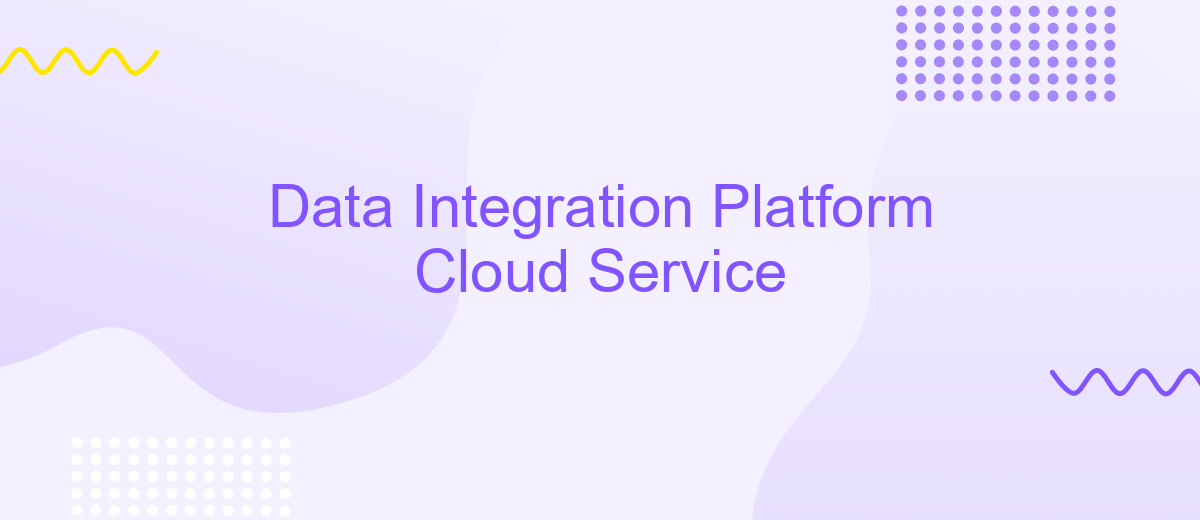Data Integration Platform Cloud Service
In today's data-driven world, seamless integration of diverse data sources is crucial for informed decision-making. The Data Integration Platform Cloud Service offers a robust solution, enabling businesses to effortlessly consolidate, manage, and analyze data from multiple origins. This cloud-based service ensures real-time data synchronization, enhanced scalability, and fortified security, empowering organizations to unlock the full potential of their data assets.
Overview
Data Integration Platform Cloud Service is a comprehensive solution designed to streamline and automate the integration of data across various systems and applications. This service enables organizations to efficiently manage data flows, ensuring that accurate and up-to-date information is available where and when it is needed.
- Automated data synchronization between diverse systems
- Scalable architecture to handle large volumes of data
- Real-time data processing and transformation
- Support for a wide range of data formats and protocols
- Enhanced security and compliance features
One of the key advantages of using a Data Integration Platform Cloud Service is its ability to simplify complex integration tasks. For instance, services like ApiX-Drive offer user-friendly interfaces and pre-built connectors, making it easier for businesses to set up and manage their integrations without extensive coding. This not only reduces the time and effort required but also minimizes the risk of errors, ensuring seamless data integration across the organization's ecosystem.
Architecture

The architecture of a Data Integration Platform Cloud Service is designed to seamlessly connect disparate data sources and streamline data flow. Utilizing a microservices-based approach, the platform ensures scalability and flexibility, allowing organizations to manage data integration tasks with ease. Each microservice handles specific functions such as data extraction, transformation, and loading (ETL), ensuring that data is processed efficiently and accurately. The platform also supports real-time data processing, which is crucial for businesses that require up-to-date information for decision-making.
To enhance the integration process, the platform can incorporate services like ApiX-Drive, which simplifies the setup and management of integrations. ApiX-Drive provides a user-friendly interface and pre-built connectors for various applications, reducing the complexity of manual configurations. This service automates data synchronization between different systems, ensuring that data remains consistent and up-to-date across all platforms. By leveraging such tools, the Data Integration Platform Cloud Service can offer a robust and efficient solution for managing data integration needs.
Components

The Data Integration Platform Cloud Service is designed to streamline and simplify the process of integrating various data sources, ensuring seamless data flow and management. This platform offers a comprehensive suite of tools and services that cater to different integration needs, enhancing data accessibility and usability across the organization.
- Data Connectors: Pre-built connectors for popular data sources, such as databases, cloud storage, and SaaS applications, enable quick and easy integration.
- ETL Tools: Extract, Transform, Load (ETL) tools facilitate the processing of data from multiple sources, ensuring it is clean, consistent, and ready for analysis.
- API Management: Robust API management capabilities allow for seamless interaction with external services, including platforms like ApiX-Drive, which automates and simplifies integration tasks.
- Data Mapping: Intuitive data mapping tools help in aligning disparate data formats, ensuring accurate and meaningful data relationships.
- Monitoring and Alerts: Real-time monitoring and alert systems provide insights into data flow and integration health, ensuring prompt issue resolution.
These components collectively empower organizations to harness the full potential of their data, driving informed decision-making and operational efficiency. By leveraging advanced integration tools and services, businesses can ensure their data is always accessible, reliable, and actionable.
Benefits

Adopting a Data Integration Platform Cloud Service can significantly transform your business operations by streamlining data management processes. It enables seamless data flow between various applications, ensuring that your data is always up-to-date and accessible when needed.
One of the key advantages of such a service is its ability to handle complex data integration tasks with minimal manual intervention. This not only saves time but also reduces the risk of human errors, thus improving overall data accuracy and reliability.
- Automated data synchronization across multiple platforms
- Real-time data updates for informed decision-making
- Enhanced data security and compliance
- Scalability to accommodate growing data needs
- User-friendly interface for easy management
Services like ApiX-Drive further enhance these benefits by offering customizable integration solutions that fit your specific business requirements. With its intuitive setup and powerful features, ApiX-Drive ensures that your data integration processes are both efficient and effective, empowering your business to thrive in a data-driven world.


Use Cases
Data Integration Platform Cloud Service can be utilized in various scenarios to streamline business processes and enhance data management. One common use case is the synchronization of customer data across multiple systems. For instance, businesses can use the platform to automatically update customer information in their CRM, marketing tools, and e-commerce platforms, ensuring consistency and accuracy. This eliminates the need for manual data entry, reduces errors, and saves time, allowing teams to focus on more strategic tasks.
Another significant use case is the integration of disparate data sources for comprehensive analytics. Organizations can leverage the platform to aggregate data from various sources such as databases, cloud storage, and third-party applications. Tools like ApiX-Drive can facilitate these integrations by providing a user-friendly interface to connect different services effortlessly. This consolidated data can then be used for generating insightful reports and making data-driven decisions. By automating data flows and centralizing information, businesses can gain a holistic view of their operations and improve overall efficiency.
FAQ
What is a Data Integration Platform Cloud Service?
How does a Data Integration Platform Cloud Service improve data accuracy?
Can I use a Data Integration Platform Cloud Service to integrate data from different applications?
What are the benefits of using a cloud-based data integration platform?
How can I automate data integration processes using a Data Integration Platform Cloud Service?
Time is the most valuable resource in today's business realities. By eliminating the routine from work processes, you will get more opportunities to implement the most daring plans and ideas. Choose – you can continue to waste time, money and nerves on inefficient solutions, or you can use ApiX-Drive, automating work processes and achieving results with minimal investment of money, effort and human resources.

